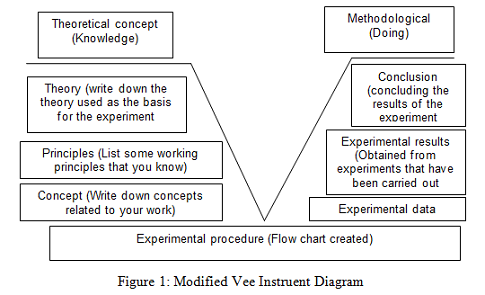
The Effect of Inquiry Based Learning With V-Diagram on Students Science Process Skills in Provision Solution Materials
Abstract
Keywords
Full Text:
PDFReferences
Creswell, J. W. (2012). Educational research: Planing, conducting, and evaluating quantitative and qualitative research (edisike-4). Upper Saddle River. NJ: Merrill.
Delen, I., & Kesercioglu, T. (2012). How middle school students science process skills affected by turkey’s national curriculum change. Journal of Science Education, 9(4), 3-9.
Gowin, D, B., & Alvarez, M, C. (2005). The art of educating with V diagrams. New York: Cambridge University Press.
Hwang, Wu., Zhuang, & Huang. (2013). Effects of the inquiry-based mobile learning model on the cognitive load and learning achievement of students, Interactive Learning Environments, 21(4), 338–354.
Kadriye, K. (2018). Determination Of Teacher Candidates’ ViewsConcerning V Diagrams Used In General Biology Laboratories, European Journal of Educational Research, 7(2), 181-187.
Koksal, E, A., & Berberoglu, G. (2014). The effect of guided-inquiry instruction on 6th grade turkish student’s achievement, science process skills, and attitude toward science, International Journal of Science Education, 36(1), 66-78.
Kong, S, C., & Song, Y. (2014). The impact of a principle-based pedagogical design on inquiry-based learning in a seamless learning environment in Hong Kong, Educational Technology & Society, 17(2), 127-141.
Lord, T., & Orkwiszewski, T. (2006). Moving from didactic to inquiry-based instruction in a science laboratory, The American Biology Teacher, 68(6), 342- 345.
Nwagbo, C. (2006). Effects of two teaching methods on the achievement in and attitude to biology of students of different levels of scientific literacy, International Journal of Educational Research, 45,(-) 216-229.
Olufunminiyi, A, A., & Afolabi, F. (2010). Analysis of science process skills in West African senior secondary school certificate physics practical examinations in Nigeria. American-Eurasian Journal of Scientific Research, 5(4), 234-240.
Pedaste, M., Maeots, M., Leijen, A., & Sarapuu, S. (2012). Improving students’ inquiry skills through reflection and self-regulation scaffolds, Technology, Instruction, Cognition, and Learning, 9,(-), 81-95.
Perry, V, R., & Richardson, C, P. (2001). The New Mexico tech master of science teaching program: An exemplary model of inquiry-based learning. In Frontiers in Education Conference (Vol. 1). IEEE. http://dx.doi.org/10.1109/fie.2001.963917
Roehrig, G, H., & Luft, J, A. (2004). Inquiry teaching in high school chemistry classrooms: The role of knowledge and beliefs, Journal of Chemical Education, 81(10), 1510-1516.
Sanjaya, W. (2009). Strategipembelajaranberorientasistandard proses Pendidikan. Jakarta: KencanaPerdana Media Group.
Schunk, D, H. (2012). Teori teoripembelajaran: PerspektifeducationEdisikeenam. Yogyakarta: Pustaka Pelajar.
Tekes, H., & Gonen, S. (2012). Influence of V-diagrams on 10th grade Turkish students’ achievement in the subject of mechanical waves. International Council of Associatory for Science Education, 23(3), 268-285.
Yasukham, T., Supasorn, S., & Wongkhan, W. (2011). Enhancing students' critical thinking skill and learning achievement of chemical reaction rates by using science inquiry process, Journal of Srinakharinwirot University (Sci. & Tech.), 3(1), 320-326.
DOI: http://dx.doi.org/10.31258/jes.4.4.p.718-726
Refbacks
- There are currently no refbacks.
Copyright (c) 2020 Risme Hutapea, Jimmi Copriady, Rasmiwetti Rasmiwetti

This work is licensed under a Creative Commons Attribution 4.0 International License.
Publisher: FKIP Universitas Riau












